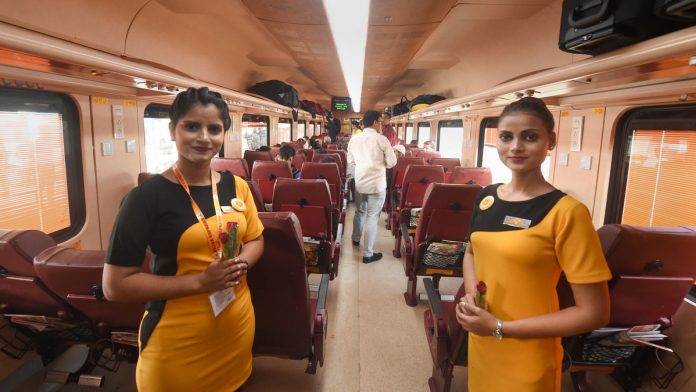
After vehemently denying the entry of private players, the Indian Railways has proposed a plan to allow private players to run their trains on around 100 routes across the country, mostly for tourism purposes.
The proposal was also mentioned by Finance Minister Nirmala Sitharaman while discussing the Budget 2020 where she said that Rs. 12,000 crore was allocated for the construction of new railway lines, Rs. 2,250 crore for gauge conversion, Rs. 700 crore for doubline, Rs. 5,786.97 crore for rolling stock and Rs. 1,650 crore for signaling and telecom among other budgetary allocations.
The announcement of the same has garnered widespread support from both, global and local companies. It has been reported that more than two dozen global companies including Alstom Transport, Bombardier, Siemens AG, Hyundai Rotem Company and Macquarie have expressed their interest to be a part of the plan. Among local players, Tata Realty and Infrastructure, Adani Ports and SEZ, Hitachi India and South Asia, Essel Group and Indian Railway Catering and Tourism Corporation (IRCTC) have come forth and expressed their interest in the venture.
The details of the plan
The list of the 100 routes that these private trains will run on has already been decided by the government. These include high-frequency routes like New Delhi to Howrah, Shalimar to Pune, Chennai to New Delhi, and Mumbai to New Delhi.
The private trains running on a particular route are set to have a head-start of 15 minutes on the route where even normal trains would run. The document read, “No similar scheduled regular train will depart in the same origin destination route within 15 minutes of the scheduled operation of the concessionaires (private players) train.”
The proposal also says that the private companies will have the autonomy to decide the fare on the particular route the train will run and they will be also be responsible for financing, procuring, operating and maintaining the trains.
It has also been announced that the Kisan Rail – national cold supply chain for perishables including meat, milk and fish will be set up by the Indian Railways through the Public-Private-Partnership (PPP) arrangement.
Why railway unions are opposing the plan
Ever since the government has announced its intentions of privatizing the Indian Railways, the unions have vehemently opposed the same.
The Dakshin Railway Employees’ Union complain that first and foremost, no announcement of filling up the 3 lakh vacant posts in the Indian Railways.
Union assistant divisional secretary V Ramkumar of the Southern Railway Mazdoor Union told The Hindu that the with the decision of giving away the profitable routes to the private sector, will leave the unprofitable routes to the railway administration eventually making it face a huge loss and go down the path that BSNL did.
R Sankaranarayanan of the Dakshin Railway Employees’ Union said that the decision to operate Kisan cargo trains won’t benefit the farmers as expected because the private players would not offer them any freight fare concession during transportation.
The most adverse effect of privatisation will be the burden on passengers who will have to pay more for tickets than what they cost now. People from the socio-economically backward classes will not be able to avail of the services offered by the private trains. There will be no concessions offered to students, senior citizens or the disabled and the fares would potentially go up during peak season as the government wouldn’t have a say in regulating them.
With the anti-passenger and profit-centric approach of the Indian government, the privatisation of the Indian railways has begun. It is set to leave the far-flung areas out of its reach because the privatisation of routes to such areas will not be profitable to the private players.
Instead of focusing on the safety and comfort of the more than 13,000 trains on the network, the ruling government has once again shifted its focus from the needs of the common passenger to serving the needs of capitalist top bosses who exploit the marginalized for their profits.
Related:
No love in the air? Plans to run special Karva Chauth train derail, IRCTC left red-faced
The Indian Railways Need to be Saved
Is the Modi Govt Preparing to Sell Off Indian Railways?